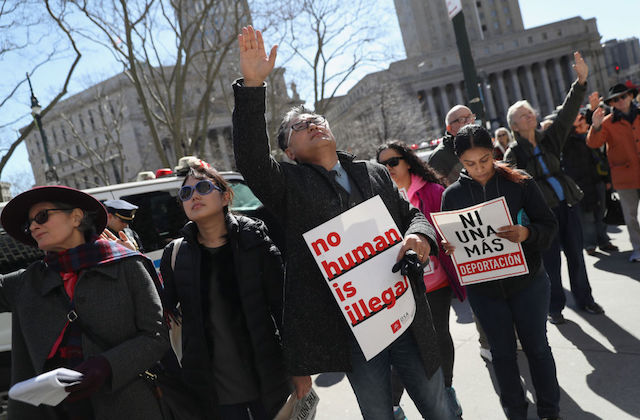Judge Blocks Trump's Order to Withhold Federal Funds From Sanctuary Cities

On his fourth day in office (January 25), President Donald Trump issued two executive orders that directed the construction of a wall along the United States-Mexico border, increased immigration enforcement and denied federal grants to sanctuary cities, which are jurisdictions that refuse to hold immigrants with undocumented status for federal officers. Yesterday (November 21), a federal judge ruled that a portion of one of the orders, titled “Enhancing Public Safety in the Interior of the United States,” is unconstitutional.
Judge William H. Orrick of the United States District Court for the Northern District of California issued a permanent injunction that blocks Section 9(a) of the order, which says that "jurisdictions that willfully refuse to comply with 8 U.S.C. 1373 (sanctuary jurisdictions) are not eligible to receive federal grants, except as deemed necessary for law enforcement purposes by the attorney general or the secretary." Orrick ruled that the language violates the Fifth and Tenth Amendments and the separation of powers doctrine, which exists to prevent abuse of power.
The Washington Post reports that the ruling is a response to a lawsuit filed by San Francisco and Santa Clara County (California) against Trump, which garnered a temporary injunction from Orrick back on April 25. The government argued in court and via a memo from Attorney General Jeff Sessions that the order would only apply to funds awarded by the Department of Homeland Security (DHS) and the Department of Justice (DOJ), but Orrick said that claim did not match the language of the executive order.
From the decision:
The Constitution vests the spending powers in Congress, not the president, so the executive order cannot constitutionally place new conditions on federal funds. Further, the Tenth Amendment requires that conditions on federal funds be unambiguous and timely made; that they bear some relation to the funds at issue; and that they not be unduly coercive. Federal funding that bears no meaningful relationship to immigration enforcement cannot be threatened merely because a jurisdiction chooses an immigration enforcement strategy of which the president disapproves. Because the executive order violates the separation of powers doctrine and deprives the Counties of their Tenth and Fifth Amendment rights, I grant the counties’ motions for summary judgment and permanently enjoin the defunding and enforcement provisions of Section 9(a).
San Francisco City Attorney Dennis Herrera issued a statement celebrating the order:
We live in a democracy. No one is above the law, including the president. President Trump might be able to tweet whatever comes to mind, but he can’t grant himself new authority because he feels like it. When you have a president who describes our judicial system as ‘a joke,’ the value of three equal branches of government becomes even clearer. This case is a check on the president’s abuse of power, which is exactly what the framers of the Constitution had in mind.
The only way to stop a bully is to stand up to him. That’s what San Francisco has done.
[…]
I’m grateful that we’ve been able to protect billions of dollars that help some of the most vulnerable Americans. We’re talking about low-income families, seniors, foster children and people with disabilities. This is money that helps provides food, health care and a roof over their heads. It’s money that pays for bridges and public transit. Those are the programs this administration targeted in its misguided attempt to vilify immigrants.
At press time, the DOJ had not issued a statement on the decision. The decision came on the same day that the DOJ announced $98 million in law enforcement grants that provided special consideration for municipalities that agree to help federal agencies detain immigrants.
